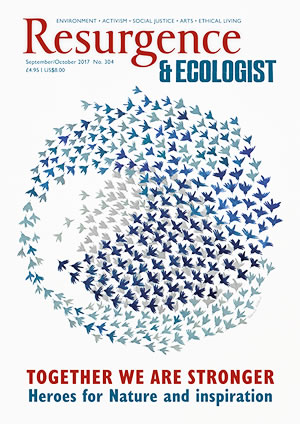“Find your place on the planet,” wrote the poet Gary Snyder. “Dig in, and take responsibility from there” – a mantra informing both this book and its earlier companion, A Silent Joy: Diaries of an Italian Hill Farm. Both books contain true-life vignettes in beautiful prose, evoking the spirit of place through the rhythm of the seasons – through Earth’s time.
Etain Addey had found her place on the planet by 1980, when she left city life and her job in Rome to inhabit a tumbledown farmhouse on the edge of the Apennine Mountains in Umbria. Disillusioned by the soulless ethos of her workplace and the spiritual wasteland of consumer society, she made a radical choice: to limit her needs and seek indigenous ‘right livelihood’ in wild Nature. With her Swiss partner, Martin, she began to “dig in” – to inhabit wholeheartedly the place that would become a convivial home to all their relations – a growing family, friends, neighbours, visitors, plants and animals.
Yet something more fundamental than disenchantment drove Addey to embrace the wild world: the deep need to plunge her hands into the many substances of the earth, and a longing for “the friendship of other species, the touch of non-human bodies”. Satisfying these needs would prove to be transformative: daily communion with the earth and wild Nature would entail a joyful and at times terrifying process of mortificatio, a dissolution of self with a deep-rooted experience of participation and expansion of awareness. Moving through the months of the year and the cycles of the seasons, Addey’s diaries chronicle lives lived in recognition of their mutual dependence and the kinship of all creation.
Etain Addey was born during a storm on a remote Cornish hill farm in circumstances her mother would recite to her on several occasions as she grew up in London. The story included a mysterious and very deep well. Beyond memory, in the crucible of myth and imagination, the deep well became for Addey a powerful symbol of the physical world into which the soul descends. In this descent into the Underworld it becomes “necessary to embrace this physical world wholeheartedly, to take part without reserve, if we want to climb back out of the Underworld with the gold of self-knowledge”.
Perhaps the greatest gift of this book is the way in which it constantly dispels the hubristic delusion that humans are the only form of conscious intelligence on Earth. Addey writes: “By removing the subjectivity of the rest of creation … we have ruined ourselves … the child is broken, the ancestor is mad.” The book also dispels the alienation this delusion has engendered in our culture.
A moment of epiphany comes to Addey in the savage, merciless stare from one of her hens: “That cold and pitiless eye belonged to Baba Yaga!” And it is this meeting of the mythic with everyday life that makes her landscape so rich and her life within it so potent.







